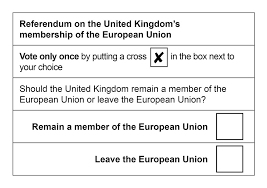 Most of us, some possibly for different reasons, are rather fed up with this debate. Apparently, now, we are told that the ignorant electorate didn’t understand the question. I am led to believe some of them didn’t know what it was they were voting to leave. I need to address this.
Most of us, some possibly for different reasons, are rather fed up with this debate. Apparently, now, we are told that the ignorant electorate didn’t understand the question. I am led to believe some of them didn’t know what it was they were voting to leave. I need to address this.
No, I mean I NEED to address this, for the sake of my own mental health.
The European Union’s own Wikipedia page states in its opening paragraph:
“The European Union (EU) is a politico–economic union of 28 member states that are located primarily in Europe. It has an area of 4,324,782 km2 (1,669,808 sq mi), and an estimated population of over 510 million. The EU has developed an internal single market through a standardised system of laws that apply in all member states. EU policies aim to ensure the free movement of people, goods, services, and capital within the internal market,[12] enact legislation in justice and home affairs, and maintain common policies on trade,[13] agriculture,[14] fisheries, and regional development.[15] Within the Schengen Area, passport controls have been abolished.[16] A monetary union was established in 1999 and came into full force in 2002, and is composed of 19 EU member states which use the euro currency.”
So, that’s what the EU is, stated as simply and basically as possible.
The referendum posed the question, stated on the ballot paper:
“Should the United Kingdom remain a member of the European Union or leave the European Union?”
The voter was asked to place a single “X” alongside one of the two possible responses:
“Remain a member of the European Union” or “Leave the European Union”
There were no qualifications offered. The voter was not asked whether they would like to leave the EU but somehow magically remain a “member” of the single market, as if such a membership even existed or such thing were even remotely possible. They were not asked whether they’d like to be involved in the negotiations of the subsequent relationship, or whether, if they didn’t like the outcome of those negotiations they might want to change their mind. The question was simple, the outcome of a vote to leave was obvious (and simple) and for anyone incapable of understanding the ramifications they should be grateful we live in a tolerant society and have not removed their right to vote in future elections or referenda.
Now then, can we please stop with these desperate attempts to thwart the electorate and in particular, the intelligent ones amongst them who voted to leave – in greater numbers than any electorate has ever voted for anything else in this country ever before – and leave? Just leave?
Thank you.
Absolutely right. The electorate voted and most of those who voted, voted to Leave. They did this despite there being no guarantees, despite being told by many people that it was a leap in the dark, that recession would inevitably follow a Leave vote.
They were told that to vote Leave meant they would be poorer, and despite all the warnings they voted to Leave, many with the genuine expectation that they would, in fact, become financially poorer for having done so. They may well find that coming true although I doubt it. Even if they do I am sure they will not regret their choice.
Remainers deride them for not knowing what the destination was, as if they were fools to vote for something they had never seen, likened to buying a house without knowing anything about it.
Those still pointing out the folly of having voted Leave just don’t get it. They have no comprehension of the feeling that you get when you know you have done something to unshackle your country from the decisions of others who have no affinity for your country.
Poorer? I never felt so rich in my life.
LikeLiked by 1 person